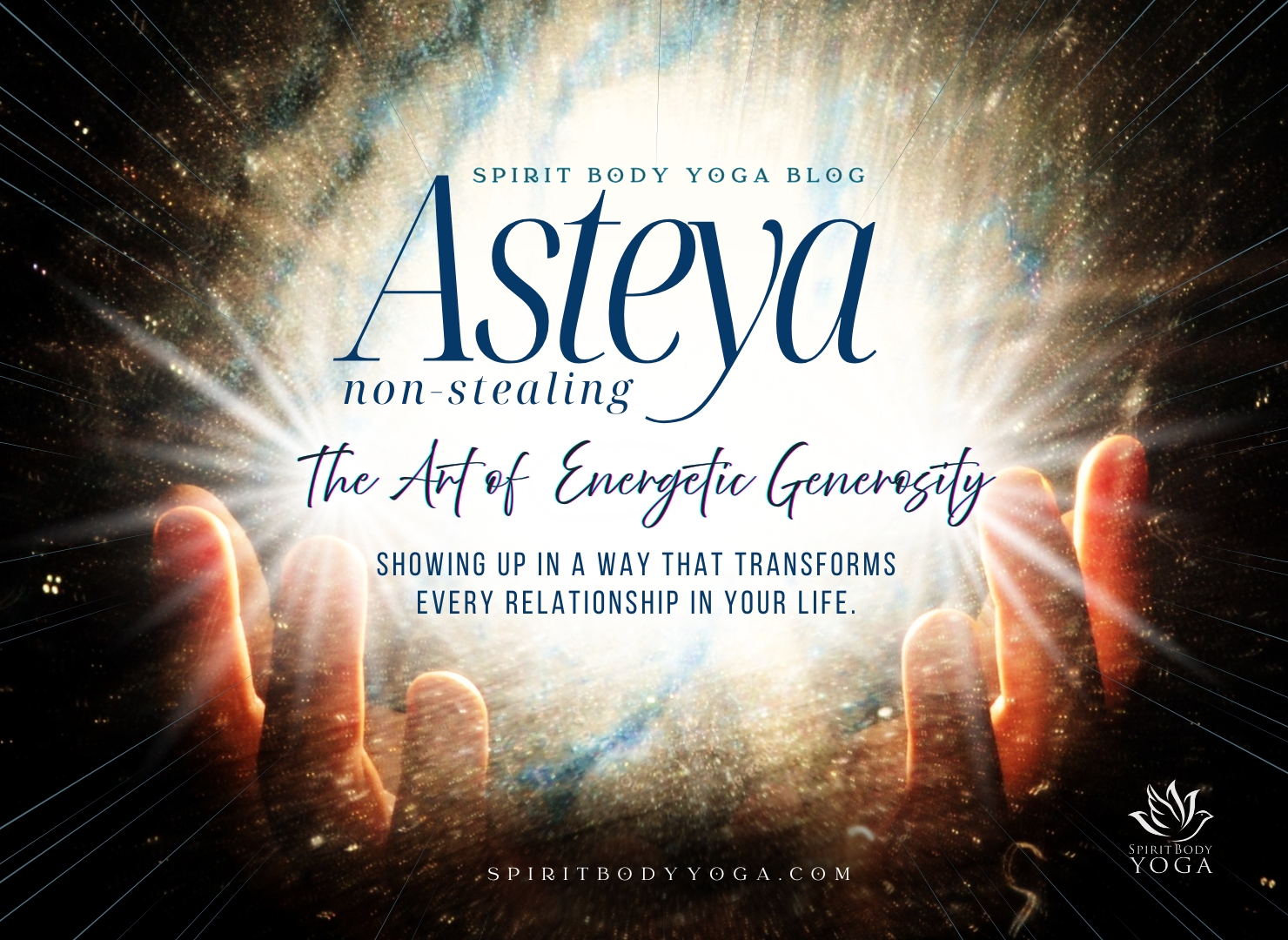Have you ever walked into a room and immediately felt a heaviness and no one had even said a word yet? Or maybe you’ve left a conversation feeling like someone just took a little piece of your soul along with your afternoon.
Energy exchanges are happening all the time and they can either leave us filled up or completely depleted. This is where Asteya, the yogic principle of non-stealing, comes in.
Asteya is one of the five Yamas — the ethical guidelines in Patanjali’s Yoga Sutras that serve as the moral compass for living well. In Sanskrit, Asteya means “non-stealing.” As the third Yama on the eight-limbed path of yoga, it invites us to live with integrity and respect, guiding us toward harmony with God, others, and ourselves.
This principle is about far more than simply avoiding the theft of material possessions. It calls us to honor the time, energy, and emotional space of others. We can take much more than what’s tangible, and often, the theft of someone’s peace, joy, or emotional balance leaves a deeper wound than the loss of any physical object. Practicing Asteya means showing up in a way that gives more than it takes, and that kind of energetic generosity can transform every relationship in your life.
We can take much more than what’s tangible, and often, the theft of someone’s peace, joy, or emotional balance leaves a deeper wound than the loss of any physical object.
𝗧𝗵𝗲 𝗛𝗶𝘀𝘁𝗼𝗿𝘆 𝗼𝗳 𝗔𝘀𝘁𝗲𝘆𝗮
Ancient yogic texts describe Asteya as cultivating a state of being so content (santosha) and so trusting in the abundance of life that we no longer feel the need to take what is not freely given. Whether that’s material goods, credit for someone’s ideas, or even someone’s time and energy.
We either leave behind a trail of life-giving energy or we steal it from others. When our actions carry selfishness, lust, gluttony, greed, laziness, envy, pride, or vengeance, we drain the room of love, peace, patience, kindness, and joy. These actions rob others of gentleness when we respond harshly, faithfulness when we break trust, and goodness when we act selfishly.
Conversely, when we choose to bring with us generous energy, we leave behind a legacy of life: joy that lifts others, peace that calms, patience that makes room for growth, kindness that restores dignity, goodness that blesses, faithfulness that strengthens trust, gentleness that heals, and confidence that lifts people up. The question we must ask is: “what energy am I leaving behind in the spaces I enter? Am I taking from the people around me, or am I depositing life and light into them?”
A Spiritual Perspective
Scripture is full of wisdom on how we are called to honor others. It reminds us to look not only to our own interests, but also to the interests of others (Philippians 2:4). This is a divine invitation into a lifestyle of humility, empathy, and deep care, This is a way of living that lifts others up rather than draining them. The Bible calls us to “outdo one another in showing honor,” (Romans 12:10 ) a beautiful picture of Asteya in action.
Practicing Asteya from a spiritual lens isn’t just about avoiding harm or withholding selfish behavior, it’s about stepping into a rhythm of life that actively gives. It’s choosing to offer presence instead of distraction, encouragement instead of criticism, generosity instead of grasping. It’s a call to be intentional stewards of the energy we bring into every room, to be people who leave others feeling lighter, more seen, more alive, and more loved.
Asteya Everyday
In other words, Asteya invites us to become aware of the ways we unintentionally “take” from others and choose instead to leave them better than we found them.
Here are a few ways you can embody the art of energetic generosity this week:
- Check in with yourself before you enter a room or a conversation. Ask yourself, “What kind of energy am I bringing? How can I shift to add to this space?”
- Listen fully instead of interrupting. Really take the time to care about the other person and what they are saying.
- Avoid emotional dumping unless you have permission from the person first, and you know that person has the capacity to hold space. Ask yourself, “Does this person have the space and energy for what I want to say?”
- Respect time. Show up when you say you will, end conversations when needed, and avoid monopolizing someone’s day. Time is the most valuable asset that we have so respect the time of others and use your time wisely.
- Respect boundaries and down-time of yourself and others’.
- Give credit freely. Celebrate the dreams, aspirations, contributions, and successes of others.
- Fill your own cup. Practice self-care so you’re coming from a place of overflow rather than neediness.
- Leave people lighter. Look for ways to encourage, speak life, and bring joy into interactions.
When we practice Asteya, we stop draining others and start filling them with light, love, and respect. This is the art of energetic generosity and it’s one of the most beautiful ways we can reflect the heart of God and create more space for connection, deep friendships, and peace.
So, what’s one way you can respect someone’s energy today and leave them better than you found them?


Leave a Reply